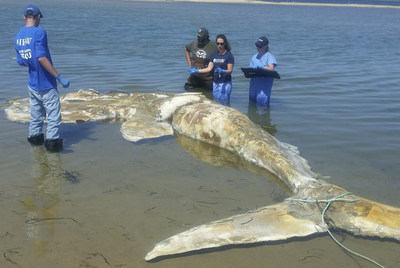Conservationists look for answers in unprecedented North Atlantic right whale deaths
WASHINGTON, Aug. 10, 2017 /PRNewswire-USNewswire/ -- Endangered North Atlantic right whales have experienced a shocking number of fatalities in 2017, causing alarm among biologists and conservationists for their depleting population of only 500 animals.

"A population this small cannot withstand such a drastic decrease in numbers over such a short period of time" said Brian Sharp, IFAW's Marine Mammal Rescue and Research Manager, "there is a pressing need to determine the factors contributing to their deaths in order to potentially institute appropriate mitigation efforts."
On August 9, 2017, the International Fund for Animal Welfare (IFAW) was on Martha's Vineyard conducting a necropsy (animal autopsy) on the most recently reported dead right whale. Sadly, initial findings from the investigation showed lesions consistent with entanglement wounds, though further tests are still pending.
Earlier this year, in April IFAW led another investigation into the death of a young female right whale in partnership with the National Oceanic and Atmospheric Administration (NOAA) and other stranding network partners. Her necropsy showed obvious signs of blunt force trauma indicative of a vessel strike.
"It's really worrisome to know that another young right whale has died in our waters," said Misty Niemeyer, Necropsy Coordinator for IFAW. "As an endangered species of approximately 500 individuals, every animal is important for the survival of the population. We need to learn as much as we can from this tragic death and gain valuable insight in hopes to further protect the species."
The majority of recent right whale fatalities have occurred in Canada's Gulf of St. Lawrence. Since June 7, 2017, at least ten deceased North Atlantic right whales have been discovered there. The cause of death for at least two of the whales was determined to be blunt force trauma from a vessel strike and one death occurred from entanglement in fishing gear.
The death rate of this endangered species is so alarming, Fisheries and Oceans Canada closed down several snow crab fishing areas in the Gulf of St. Lawrence early in an effort to reduce the risk of whale's encountering fishing gear.
Rerouting shipping lanes and reducing ocean noise are also proposed solutions to reduce the amount of fatalities. Sonic Sea, an Emmy-nominated documentary created by IFAW and the Natural Resources Defense Council (NRDC), delves into the crisis of ocean noise and its impact on marine mammals.
In addition to raising awareness about the problems ocean noise causes with marine life, IFAW also partnered with several marine conservation organizations to create the mobile app, Whale Alert, to notify mariners of nearby whales. The app notifies mariners of whales nearby, allowing vessels to adjust speed and direction to avoid harmful collisions with whales.
IFAW is just beginning a project in collaboration with the National Oceanographic and Atmospheric Administration and Woods Hole Oceanographic Institution that will summarize mortality patterns in the North Atlantic right whale population over the past 12 years to better help policy-makers institute protections for this endangered species.
IFAW has long advocated for right whale protection and has worked alongside industry and government to implement best practices to help ensure their survival.
About IFAW (International Fund for Animal Welfare)
Founded in 1969, IFAW rescues and protects animals around the world. With projects in more than 40 countries, IFAW rescues individual animals, works to prevent cruelty to animals, and advocates for the protection of wildlife and habitats. For more information, visit www.ifaw.org. Follow us on social @action4ifaw and Facebook/IFAW.
SOURCE International Fund for Animal Welfare
News published on and distributed by:



